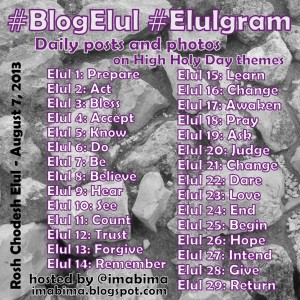It’s kind of funny talking about “voice” in a written medium, and yet it can be quite unmistakable. If I see a piece by Julien Smith, I know who wrote it before I see the author’s name. The same is true of Seth Godin and a few other authors. These are people who have a distinct style, a tone of voice that comes through in their writing.
Any decent course on blogging or writing will tell you how important it is to “find your voice”, to express yourself in an authentic, recognisable way. Of course, to be authentic, first you have to have some idea of who you are, and that’s often the rub. If we define ourselves in terms of our work, our family, our social status, what do we do if we lose any of these, G-d forbid? Is there somebody in there, completely separate from all of those, and do I like this person? It’s a scary thought.
In the Rosh HaShana liturgy there is a famous, moving prayer in which we beg G-d to hear our voice and have compassion on us. In these days of Elul, we also need to work on hearing our own voice. It may not be as mellifluous as that of the singer in this recording, but it is ours, and therefore precious, unique and worthy of hearing.


Oh, I agree entirely, Holly! But many people don’t know what their natural voice sounds like. It makes sense to try different things and see what fits, like a child playing in her mother’s wardrobe. Eventually something will stick ;-).
Hadass Eviatar recently posted…#BlogElul 9 – Hear
It’s interesting. When writers try too hard to “find” their voice, they often lose it. I think the trick to having an authentic voice in writing is to be yourself – to dig down honestly into your thoughts and what it is you want to express until you hit bone. It’s not about “flair” or “fashion” and I think some writers get confused, because they think of voice and style as synonymous, and then forget that style flows from speaking and writing in your own natural voice.
so Hadassi, when you talk to yourself and listen to yourself, what language are you speaking? When its totally private between you and you – do you speak Hebrew or English? or Dutch? Does the topic matter? Do you notice? Is it a mishmash, like you spoke as a baby – mommy, come and tie my na’alyim, and the best, the gem that I tell in every class and talk about bilingual children – your towel, which was mygevet. Is that how you speak to yourself? I know you are more interested in the content right now, but I believe the form has effects too.
It’s almost entirely English. Sometimes I get blasts from the past in Hebrew or even Dutch, when they seem to be more appropriate to what I’m trying to say. But all of my parenting and most of my meaningful Jewish experiences happened here, so the words that go with them are English. I actually tried to raise Rafi bilingual but failed because I didn’t have parenting words in Hebrew.
You are right about the form being important, too. Tomorrow’s keyword is “See”, maybe that will go in that direction. I’ve given up trying to predict what will come …